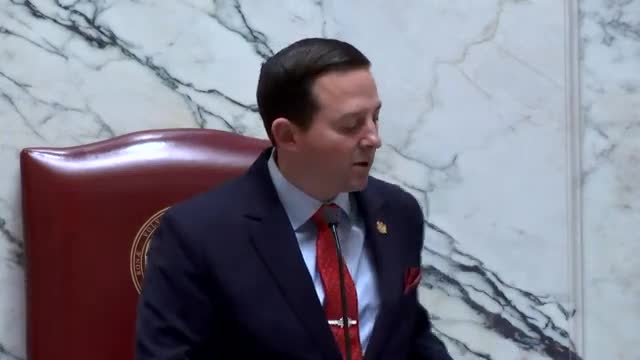Senate approves desk officers, adopts session spending order, sustains veto on duplicative bills and refers recess appointments
Get AI-powered insights, summaries, and transcripts
Subscribe
Summary
On opening day the Senate unanimously approved desk officers, adopted an order for session expenses, referred about 430 recess appointments to executive nominations, sustained a veto on duplicative bills and postponed a second veto calendar; several bills were introduced.
The Maryland Senate completed several organizational actions on Jan. 8, 2025, including election of desk officers, adoption of an order to appropriate funds for session expenses, appointment authority for session employees, and initial handling of vetoed bills and gubernatorial recess appointments.
The clerk read the majority leader’s order electing desk officers for the session; the chamber approved the slate unanimously. Officers named included Nicole M. Alexander as Secretary of the Senate, Veronica Blair and Caitlin E. Sanders as assistant secretaries, Sean M. Noel as journal clerk, Andrea C. Jones as reading clerk, Nicholas D. Garrett as proceedings clerk and Rochelle Thompson as chief page.
By unanimous consent the Senate adopted an order that money appropriated for the expense of the 2025 legislative session be paid upon joint order of the presiding officers. The chamber also approved an order allowing the president to appoint employees necessary for session business, per the budget.
A message from Gov. Wes Moore transmitted appointments made during the 2024 recess and requested confirmation. The clerk announced those recess appointments (approximately 430) were referred to the Senate Committee on Executive Nominations.
On veto calendars, the Senate considered a consent calendar of duplicative vetoed bills and voted to sustain the veto with a recorded result of 44 votes in the negative (veto sustained). A second veto calendar (policy bill, Senate Bill 60) was moved by the majority leader to be postponed indefinitely; the motion carried without objection.
The clerk also read introductory bills brought forward at the opening: Senate Bill 1 (legally protected health care and reproductive services), Senate Bill 101 (Wicomico County vehicle laws), Senate Bill 187 (drunk driving and commercial driver's license), and Senate Joint Resolution 1 (ratifying the federal child labor amendment), among a larger stack of filings the clerk said began at bill 249 for the day.
Why it matters: Naming desk officers and approving session spending are routine but necessary steps to open the legislature. Referral of hundreds of recess appointments signals significant confirmation work ahead. The veto calendar action sustains the governor’s veto on duplicative measures and postpones further consideration on other vetoed policy bills.
